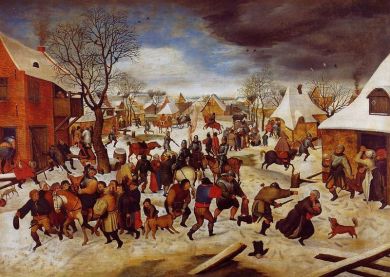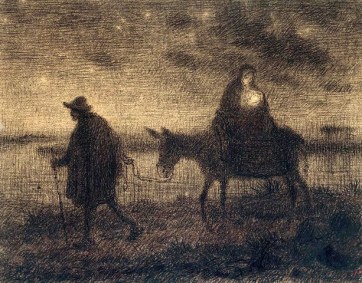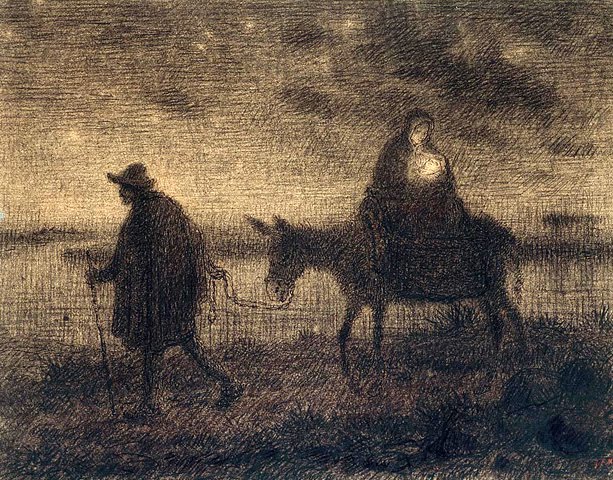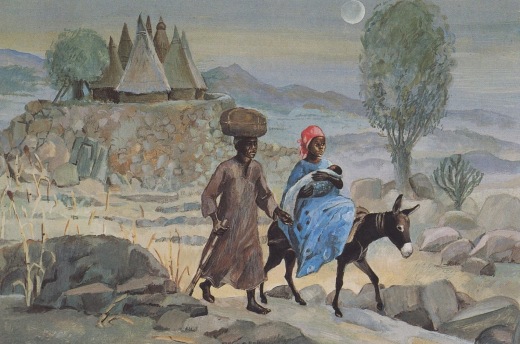A sermon for the Second Sunday after Christmas Day, Year A
Matthew 2:13-15, 19-23
 During the twelve days of Christmas, the church around the world, the liturgical church at least, commemorates a day that often goes overlooked in the calendar of the church year – The Day of the Holy Innocents on December 28th. Holy Innocents is a time when we remember all those innocent children who were slaughtered by King Herod in his desire to exterminate the promised messiah. Obviously we overlook it because it is an unpleasant moment in time to remember, especially in the midst of Christmas celebrations. In fact we rarely hear this passage read on a Sunday. We may even be a bit confused why we hearing a story about a time after the Wisemen have departed when they haven’t even arrived yet in the church calendar!
During the twelve days of Christmas, the church around the world, the liturgical church at least, commemorates a day that often goes overlooked in the calendar of the church year – The Day of the Holy Innocents on December 28th. Holy Innocents is a time when we remember all those innocent children who were slaughtered by King Herod in his desire to exterminate the promised messiah. Obviously we overlook it because it is an unpleasant moment in time to remember, especially in the midst of Christmas celebrations. In fact we rarely hear this passage read on a Sunday. We may even be a bit confused why we hearing a story about a time after the Wisemen have departed when they haven’t even arrived yet in the church calendar!
Confusion, calendars, and discomfort aside, let’s not let this opportunity slip by unnoticed, for I think this moment in the story of Jesus’ life is one of the most important to help us understand both his family history and his early formation.
This particular story is, of course, part of the larger epic story we tell this time of year, but we privileged Christians who live in 21st Century America, we who enjoy religious freedom and relative peace and security, might not always be able to find much connection with this story. It’s not part of our experience. But let me assure you, there are many Christians alive today who hear this story in a very different way.
Of course, all Christians see in this story a fulfillment of prophecy. In Hosea God prophesies: “Out of Egypt have I called my son”. Having been warned of Herod’s plans by an angel, Joseph takes Mary and the infant Jesus and flees to Egypt, perhaps because it was one of the places that Herod could not reach them. Now, this was no small decision. Egypt represented for Jews what perhaps the Deep South may represent for African Americans even today. It’s a place full of bad memories and negative connotations. Their people had been enslaved there. But this flight to Egypt also serves to connect Jesus and his family to the larger history of Israel and in turn provide a connection to Hosea’s prophecy.
But there is much more at work here in Matthew’s Gospel than just fulfilling a prophecy. I find in this account themes that have proven universal, continuing to this very day.
 Imagine how these verses sound to a Palestinian family today, or to a mother who has had to flee across a border in order to save her family. Where we might think it unimaginable to have to leave our homeland in order to find safety, there are many people alive today for whom such a scenario is very much a reality.
Imagine how these verses sound to a Palestinian family today, or to a mother who has had to flee across a border in order to save her family. Where we might think it unimaginable to have to leave our homeland in order to find safety, there are many people alive today for whom such a scenario is very much a reality.
I think this story is very important for us to hear and to consider – the idea of God’s chosen son being so vulnerable and so close to death should both wake us up and even anger us a bit. Yes, we should be angry at the tyrant, Herod, but I believe the scripture also invites us to be outraged at more than just this incident. I believe that Jesus and his family represent all those who live in fear and are driven from their homes by this fear. At this moment, Jesus is a refugee.
Each time we gather to worship, we pray for the persecuted, the oppressed, those who suffer. Here in Matthew’s Gospel, we are reminded that these people are not a remote concept we hear about on the news. Even if we can manage never to encounter a homeless person or a refugee, we must look at them here in the form of Jesus, Mary, and Joseph, the very holy family we emulate so much this time of year. They were homeless refugees, fleeing arrest and probable death.
We are familiar with the concept of Emmanuel, God with us, and here we hear even more clearly how God has chosen not just to take on human form, but to suffer as we humans often suffer – to be hungry, to be frightened, to be unwelcome.
Now an honest question might come from a precocious Sunday School student at this point, “But why didn’t God just stop Herod?” Note precocious students often ask the questions aloud that the rest of us were thinking in our heads. But it is a fair and honest question. Why didn’t God stop Herod? It is certainly laughable to picture this puny mortal king raging in his little crown, threatening to destroy God’s messiah, the same God who parted the Red Sea, the same God who rescued and saved his people so many times before. And yet, in one of those moments that haunt our understanding of God, we hear how God did not stop Herod’s wicked schemes, just as God did not stop Pharaoh so many generations before. This messiah of God’s own choosing was left vulnerable, his fate uncertain. Once again, Mary and Joseph were left with no other option but to trust, as God allowed Herod’s evil plans to unfold. As uncomfortable as it may be, I think we must ponder these things in our hearts, just as Mary did.
As another Christmas season ends, and we come with the kings to worship this child, hold these images in tension – kings of the world have come to worship a refugee, an infant at the top of king Herod’s hit list. This should set the stage for us as we look forward to hearing of the ministry of Jesus in Matthew’s gospel. Many tables will be overturned. Prophecies will be fulfilled. Expectations will be confounded. What an amazing story for us to contemplate! And it’s only just beginning!
Amen



Truly, we are on a journey and in danger of spiritual destruction and death because of the enemy of our souls. We, too, are spiritual refugees and without hope until we journey to meet Jesus, worship Him, and give Him our all. PBR
For me, most human evil is caused by people, which is why we need salvation. I’m still very much a free-will Armenian.